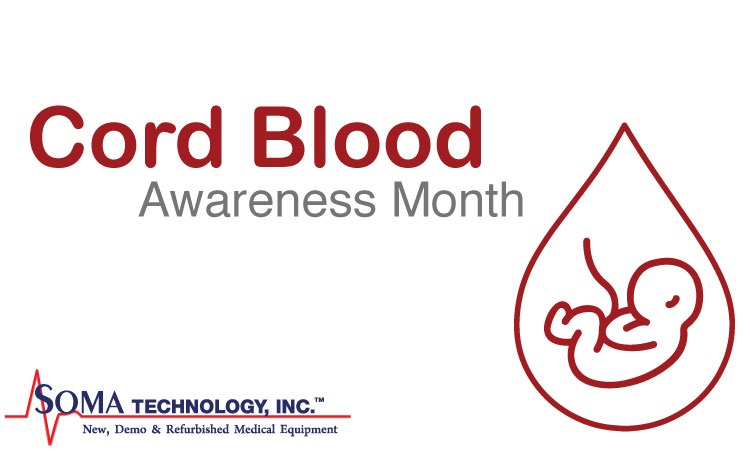July is Cord Blood Awareness Month
July 1, 2019
July is Cord Blood Awareness Month
July is traditionally known as one of the hottest months in the Northern Hemisphere, but it also is Cord Blood Awareness Month. Do you know what cord blood is or the many uses of cord blood? Do you know how vital cord blood is to the treatment of some diseases? Continue reading to learn about cord blood and stem cells!
Information on Cord Blood
What is Cord Blood?
Cord blood is the blood in the placenta and umbilical cord from when a mother has given birth. Doctors can harvest this cord blood that is rich in hematopoietic progenitor cells. These stem cells are basic cells that have not had their function of the cell turned on for a specialty. When these cells are placed in a part of the body, they can seamlessly integrate into the body. Cord blood has been used in transplant medicine for nearly 30 years. Recently, cord blood has expanded exponentially into clinical trials for a lot of different medical conditions. Since the cells in the cord blood haven’t been exposed to potential factors impacting stem cells collected later in your life, saving cord blood could prove to be an invaluable medical resource for your child in the future.
What Diseases Can Cord Blood Help?
When stem cells are placed into the body, they act as special cells that can regenerate tissue. These cells are systematically and regularly used in the treatment of some diseases. In stem cell therapy, these stem cells are used to regenerate tissue that was damaged by radiation in chemotherapy. Some cord blood can be placed in pediatric and adult blood to help with leukemia, multiple myeloma, lymphoma, and neuroblastoma, just to name a few. Over the last few years researchers, scientists, and doctors have been utilizing cord blood for regenerative medicine for conditions like autism and cerebral palsy.
There is often confusion about who can utilize the cord blood after it has been collected. Can only the child from the cord blood that was collected use their cord blood? Can a sibling also use their sibling’s cord blood? It depends on the condition being treated but sometimes both the donor and the sibling can use the cord blood. A lot of the diseases that cord blood has been used for treatment are inherited genetic diseases. This typically means that the child with the genetic disease would need cord blood from a sibling or an unrelated donor.
What Does Cord Blood ‘Banking’ Mean?
In the past few decades, it has been incredibly hard to utilize cord blood. Because adults cannot make cord blood, they need it from somewhere. Some parents have chosen to bank cord blood from their newborns, so that they may use it later in life. Cord blood banks are institutions that freeze cord blood and store it in case the cord blood needs to be used at a later time. If a person ends up having cancer, genetic disorders, or life-threatening illness that can use stem cells; they can use the blood that their parents had banked earlier to save their life. Some people argue that cord blood banking is far too expensive and is therefore not a viable treatment option for everyone.
The cord blood collection process is simple, safe, and painless. The process usually doesn’t take longer than 5 minutes and does not interfere with delivery. It’s possible to bank cord blood from both a vaginal and cesarean delivery. There are two methods that your healthcare provider will use to collect the cord blood.
- Syringe method
- Bag method
With both methods, the cord blood will be collected during the first 15 minutes following birth. After being processed, your baby’s cord blood will be stored in a laboratory facility often called a blood blank. Your baby’s cord blood will be ‘banked’ or stored in an AABB (American Association of Blood Banks) accredited facility that specializes in handling stem cells. There are no health risks related to cord blood collection. Cord blood is retrieved from the umbilical cord after it has been cut, thus preventing any pain.
Final Thoughts
If you have had a child recently, have you put their cord blood in a bank? Do you have any strong feelings towards or against cord blood banking? Do you believe that banking cord blood can fight diseases later on in life? there are endless possibilities for scientific developments on cord blood. We will need to stay tuned for any cord blood news. Comment below about cord blood!
Explore Other Blog Items By Category
Recent Posts


Surgical Microscope Rentals

